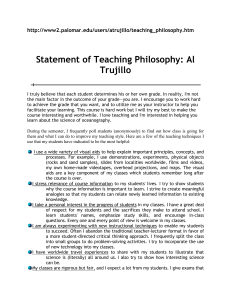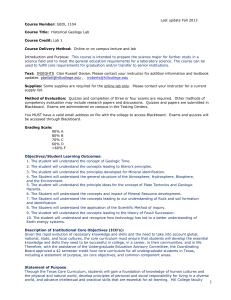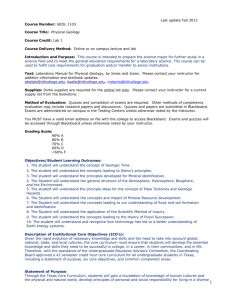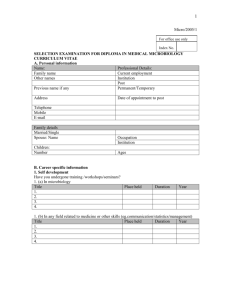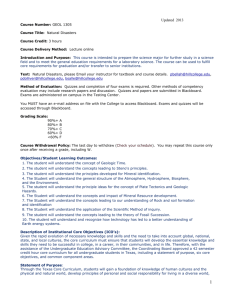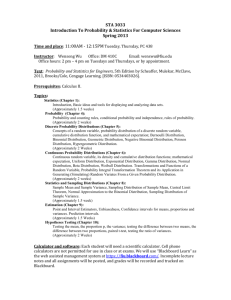1 MICROBIOLOGY 200 Fundamentals of Microbiology Dr. Gary
advertisement
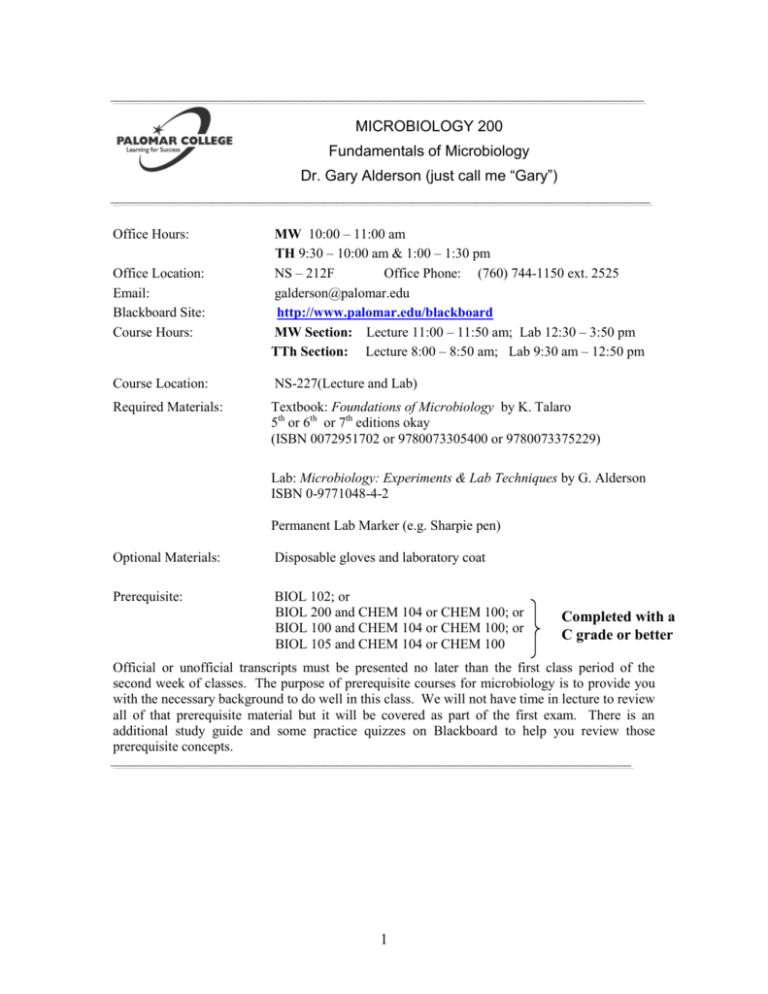
__________________________________________________________________________________________________________________________________________________________________________ MICROBIOLOGY 200 Fundamentals of Microbiology Dr. Gary Alderson (just call me “Gary”) ____________________________________________________________________________________________________________________________________________________________________________ Office Hours: Office Location: Email: Blackboard Site: Course Hours: MW 10:00 – 11:00 am TH 9:30 – 10:00 am & 1:00 – 1:30 pm NS – 212F Office Phone: (760) 744-1150 ext. 2525 galderson@palomar.edu http://www.palomar.edu/blackboard MW Section: Lecture 11:00 – 11:50 am; Lab 12:30 – 3:50 pm TTh Section: Lecture 8:00 – 8:50 am; Lab 9:30 am – 12:50 pm Course Location: NS-227(Lecture and Lab) Required Materials: Textbook: Foundations of Microbiology by K. Talaro 5th or 6th or 7th editions okay (ISBN 0072951702 or 9780073305400 or 9780073375229) Lab: Microbiology: Experiments & Lab Techniques by G. Alderson ISBN 0-9771048-4-2 Permanent Lab Marker (e.g. Sharpie pen) Optional Materials: Disposable gloves and laboratory coat Prerequisite: BIOL 102; or BIOL 200 and CHEM 104 or CHEM 100; or BIOL 100 and CHEM 104 or CHEM 100; or BIOL 105 and CHEM 104 or CHEM 100 Completed with a C grade or better Official or unofficial transcripts must be presented no later than the first class period of the second week of classes. The purpose of prerequisite courses for microbiology is to provide you with the necessary background to do well in this class. We will not have time in lecture to review all of that prerequisite material but it will be covered as part of the first exam. There is an additional study guide and some practice quizzes on Blackboard to help you review those prerequisite concepts. ______________________________________________________________________________________________________________________________________________________________________ 1 Official Palomar Course Description Fundamentals of microbiology including medical aspects of microbiology. Overview of Course Expectations This class provides a working knowledge of microbes and its special techniques. Students will learn the structure and function of prokaryotic and eukaryotic micoorganisms, as well as viruses, and how this relates to cellular processes, disease, and the environment. While lectures provide the theoretical framework, accompanying laboratory exercises offer a hands-on approach to the techniques used to isolate, culture, and characterize microbes. This course stresses critical and integrative thinking, problem solving, and good laboratory practices and experimental design that are essential to success in allied health, biology, and biotechnology. 2 Palomar’s Core Values Palomar College is a learning community dedicated to achieving student success and cultivating a love of learning. We strive to improve performance and outcomes based on evidence. To provide the highest quality learning and cultural experiences, we are guided by our core values including (1) achieving excellence in teaching, learning, and service, (2) fostering integrity, (3) ensuring equity and fair treatment, (4) celebrating diversity, (5) supporting inclusiveness of individual and community viewpoints, (5) promoting mutual respect and trust through open communication, (6) supporting innovation to enrich learning environments. Student Learning Outcomes for this course The Student Learning Outcomes (SLOs), which are routinely assessed on a college-wide scale, are as follows: 1. Demonstrate knowledge and comprehension of general microbiology principles. Topics covered include cell structure, genetics, metabolism, diversity, epidemiology, pathology of infectious diseases, and immunology as they relate to microbes. 2. Demonstrate practical application and theoretical principles of techniques used routinely in controlling, culturing, isolating, and characterizing microbes in accordance with safe laboratory practices. 3. Apply the scientific method by developing a testable hypothesis, designing and conducting appropriate microbial experiments, and critically analyzing laboratory result. Convey thorough understanding for the experiment in an original written paper using the standard scientific journal format. Specific learning objectives for this class are as follows: 1. Describe the form and function of intracellular structures and molecules and explain how these structures govern microbial life. 2. Examine the structural and metabolic diversity of microbial life, including bacteria, protists, fungi and viruses. 3. Relate the structure, genetics, metabolism, and ecology of pathogenic microbes to their life histories. 4. Explain how our immune systems respond to pathogens. 5. Explore how microbiology impacts biotechnology, pharmaceuticals, and epidemiology. 6. Describe the characteristics, route of infection, and process of disease for selected pathogenic microbes encountered in the medical profession. 7. Demonstrate a working knowledge of safe laboratory practices. 8. Demonstrate a working knowledge base of techniques routinely used in controlling, culturing, isolating, and characterizing microbes. 9. Critically analyze laboratory results in graph and written format. 10. Develop and apply experimental designs to address research questions. 3 Blackboard Resources http://www.palomar.edu/blackboard The Blackboard website for this course contains many valuable resources for you. Login to Blackboard using your Palomar College username and password. When you then click on Microbiology you will find the following resources: Announcements Whenever I hear about microbiology news items that I think might interest you, I post them here. Also check here for administrative announcements. For example, a few years ago Palomar College was closed down for a week due to severe fires in the area, and I posted daily updates here on Blackboard. Course Documents Under this heading you will find copies of all the handouts for the course. The most important of these is the set of Study Guides. There is a detailed study guide for each exam. These guides will help you focus you study time on the learning objectives of the course. If you know the material in the study guide forwards, backwards and sideways; you will do well in this class. Another important document is the Course Topics and Schedule. This is a schedule of lecture topics, chapter readings, lab exercises, exams, etc. Practice Quizzes Here is another valuable resource. I have put together a set of practice quizzes for each of the exams. The folder for the first exam even contains an example of a complete exam that I gave a few years ago. I strongly encourage you to take these practice tests to help you prepare for the exams. These practice quizzes do not count toward your grade, but some of the same or similar questions end up on the exams. You can test yourself repeatedly with these quizzes until you are getting all the answers correct. This can dramatically improve your score on the real exam. Lectures In class I present my lectures with the help of a PowerPoint outline. I will post these lectures in Blackboard. I will also try to post audio recordings of the lecture as well. However sometimes I forget to turn on the recorder, or the batteries die, etc. So don’t rely too heavily on that. I should also point out that the online version of the lecture is not a substitute for the real thing. Grades After each exam I will post an update of all your scores on Blackboard. At any point in the semester you can look in this folder to check your current grade and point total. By the way, everyone’s grades will be posted together in one spreadsheet so I need a code name from you to protect your privacy. Research Project During the second half of the semester you will have a chance to design and carry out a group research project. This folder of Blackboard contains some handouts and resources for that project. Internet Links Under this heading you will find a variety of microbiology websites. Some are quite interesting. There is even a site where you can hear the pronunciation of microbe names. 4 Grades Grades will be based on a simple point system. There is no “fudge factor” or curve. You don’t need to worry about how well anyone else is doing in the course. So it is a very objective system. The number of points you earn determines the grade you will receive. The following table lists the opportunities you have for earning points. Lecture Component Exams (6 @ 100 pts. each) Final Exam (Comprehensive) NLN Exam (or Lab Practicum) Syllabus Review Test Your points Laboratory Component Surprise Quizzes, Lab Reports & Journal 3 Graded Slides (5 points each) Other Slides (2 points each) Graded Streak Plate Unknowns Lab (Lab #36) Research Project (Lab #37) Total Total Possible 600 200 100 10 214 15 12 5 30 50 1241 points Final Grades are awarded based on the following point scale: Total Points Earned 1117 or more 993 – 1116 869 – 992 745 – 865 Below 745 Approximate Percentages 90 – 100 % 80 – 89 % 70 – 79 % 60 – 69 % below 60% Final Grade A B C D F Description of Graded Assignments Lecture Exams There will be six exams given during the lecture period. Exams provide you with an opportunity to show how much you have learned from the previous unit. Each exam contains multiple choice, fill-in the blank, definitions and essay questions. To see what a typical exam looks like, check out the sample test in the Practice Quizzes on Blackboard. Although the exams cover lecture, lab and the textbook; most of the exam questions come directly from the Study Guides. Final Exam I do not view this class as a hurdle you need to pass over before reaching your goals. Instead I see it as a chance for you to gain important knowledge that will help you in your future education and career goals. Therefore we will have a comprehensive final exam to measure what you have learned and retained at the end of the course. I recommend that you review past material often throughout the semester in order to commit your learning to long-term memory for the final and for your future. 5 NLN Exam The National League for Nursing administers a standardized, multiple choice test assessing knowledge of Microbiology. This test covers the microbiology principles of this course (the same material covered in the final exam). In lieu of a laboratory practical, you have the option of taking the NLN exam. If you would rather take the lab practical there is a study guide for it on Blackboard. The fee for the NLN Exam is $16 (due date is listed in Course Topics & Schedule) payable to the Palomar cashier. MAKE SURE YOU GET A RECEIPT AND BRING IT TO ME. I can only order as many exams as I have receipts. Syllabus Review Test You will find the Syllabus Review Test in the Documents section of Blackboard. After you have read this Syllabus take the online Syllabus Review Test in the Documents section of Blackboard. This is an open book test so you are welcome to look at your syllabus as you answer the questions. This test is worth 10 points. Surprise Quizzes & Lab Reports You should read over the lab exercise(s) before lab each day. Occasionally we will have a surprise quiz at the beginning of lab, so make sure you are always prepared. After we have finished collecting results for an exercise you should answer the Discussion questions for that lab. I will not grade every exercise, but I will make surprise lab collections. Again you won’t know when or which lab I will collect, so keep your labs up to date and complete at all times. Most of these quizzes and lab reports are worth 10 points each. The quizzes & lab reports cannot be turned in late. Journal Over the years I have found that there are certain topics that students often have trouble with in microbiology. I have discovered that students do much better on exams if I have them think and write about these topics ahead of time. So to help you learn these concepts I have developed a series of questions that you will answer in a Journal. These questions are very important for your exams. Many times the essay question on the exam is one of the Journal questions. The questions are listed at the end of each study guide. As soon as we have discussed a journal topic in lecture, you should go home and write out the answer to that question in your Journal. In your Journal the questions should be in numerical order and each question should start on a new page. Periodically I will make a surprise collection of the Journal and grade one or more of the questions, so keep it up to date. The questions are worth 10 points each. Again no late turn it. Unknowns Lab Toward the end of the semester you will use the lab skills and knowledge that you have gained to identify a pair of unknown bacteria (Lab Exercise 36). This exercise is worth up to 30 points. Research Project In the latter half of the semester you will have an opportunity to develop and carry out your own research experiment (Lab Exercise 37). For this project students will work in groups (2-4 students). This project will be worth up to 50 points. More information about this project is posted on Blackboard. DEADLINE POLICY: No late laboratory exercises, papers or other assignments will be accepted. Surprise quizzes, lab reports and journals are usually collected at the beginning of lab. They cannot be made-up or turned in late because that would not be fair to the students who were on time. So if you are late or absent for lab you will not be able to receive any points for these surprise collections. 6 ATTENDANCE: Students who attend all classes and labs have consistently been more successful in microbiology. Good students also help their classmates maintain concentration by not coming in late or taking a break in the middle of lecture. (You might want to take a bathroom break just before lecture begins.) Attendance and participation in Laboratory is mandatory. “80% of success is showing up.” --Woody Allen To encourage attendance students can earn a bonus of 30 points on their final exam for perfect attendance in lab & lecture. Perfect attendance means being on time and present for the entire class every day. (Each absence = 10 points less; each late day or lecture break = 5 points less). Although there are times when missing class cannot be helped, these extra credit points are only for perfect attendance. No excuses for bonus points. Stay healthy. There are no make-up Exams except with prior approval. If you need to miss an exam you need to talk to me BEFORE the exam takes place. The make-up Exams will usually be more rigorous than normally scheduled exams. There are no make-ups for lab Quizzes or Lab Reports or Journals at all. Withdrawal: See the Schedule of Classes (http://www.palomar.edu/admissions/Calendars.htm) for Palomar=s withdrawal/drop timetable. If you decide to withdraw from the class make sure you take care of all the proper paperwork. Classroom Etiquette: Microbiology is a difficult subject. When a cell phone or beeper goes off, it disrupts everyone’s concentration and makes learning that much more difficult. Please make sure that any electronic devices are turned off or are in silent mode during lecture. The class is likewise disrupted when someone arrives late to class or leaves the room during lecture. Again please be considerate to your fellow students by arriving on time and taking care of bathroom breaks before class begins. 7 Palomar College Academic Standards and Student Information Academic Integrity: Palomar College is wholly committed to the idea and ideals of academic integrity. We embrace and adopt the definition and related principles of academic integrity provided by the Center of Academic Integrity at Duke University in Durham, North Carolina. Students are expected to adhere to the highest standards of academic integrity, including honesty, trust, fairness, respect, and responsibility (as defined in Section 4 of the Palomar College Catalog). Although the vast majority of people are honest and would never consider cheating, occasionally a student does try to receive credit for someone else=s work. Any work that is to be graded (lab reports, unknowns, graded slides, journals, exams, etc.) must be done independently. Examples of academic dishonesty include plagiarism on a research paper, cheat sheets, copying another person’s lab exercise, etc. Allowing someone else to copy your work is also cheating. In this course, the consequences for cheating are severe. Any student cheating will be punished to the maximum extent, including an "F" grade for this course and a record of cheating on his/her permanent transcript! There are no second chances. Critical Thinking Statement (Taken from Section 5): The major role of education in America is to produce an individual who can contribute to society as a well-informed member of democracy. Competence in critical thinking empowers the college student with the ability to distinguish opinion from fact and belief from knowledge. Evaluative skills learned through elementary inductive and deductive reasoning have applications in problem solving in all aspects of everyday existence. Therefore, all examinations, assignments and activities at Palomar College should reflect academic rigor by requiring critical thinking on the part of the student. Disability Support Services: Palomar provides services to help students with disabilities successfully adapt to college life. Students who meet specific criteria may also qualify for academic accommodations. For information, or a referral, please contact Disabled Student Program and Services at Ext. 2375 or e-mail at dsps@palomar.edu Emergency Procedures: In the event of an immediate emergency, first contact 911. Then, please contact campus police at (760) 744-1150 x2289 Family Education Rights and Privacy Act (FERPA): Palomar College complies with the Family Education Rights and Privacy Act (FERPA) of 1974 concerning the information that becomes a part of a student’s permanent educational record and governing the condition of its disclosure. Under FERPA, students are protected against improper disclosure of their records. 8 Strategies for Success Survey At the end of the semester a couple years ago I surveyed the class and asked them what they had done to succeed in micro. Here are their suggestions to you….. 1. Download the study guides and answer all the questions. 2. Make sure you have enough time to learn microbiology. This class WILL demand a lot of time! Decide where you are going to make room for an additional 15 hours a week OUTSIDE of class and make yourself a commitment to stick to it. 3. Become familiar with Blackboard; it will have all assignments, practice quizzes, lecture outlines, as well as your current point tally! 4. Come to every class; be prepared and ready to learn. 5. Form a study group. Make up questions from the study guide and test one another. If you can’t get together face-to-face, then talk to one another over the phone or internet. 6. Rewrite your notes after lecture in your own words. 7. Ask questions! When you don’t understand something, ask for clarification!!!! I’m very accessible both during class, office hours, and via e-mail. 8. Take advantage of short term memory! Finish the lab assignment and Journal questions within 24 hours. 9. Take the practice quizzes multiple times. Also test yourself by re-answering your journal questions many times. Many of the same questions are on the exams. 10. Do not get behind. We have a major exam almost every other week. Don’t procrastinate on assignments or studying! Final Statements I love teaching. I cannot imagine a better job that I could do and get paid for. I especially enjoy teaching microbiology because I have great students. The vast majority my students are planning to enter a medical career and are willing to work hard to reach their goal. I promise you I will do my best to make this class interesting and relevant to you. We will of course cover the core principles of microbiology, but wherever I can I will point out the medical applications of these principles. This course takes a large time commitment, but if you do well in this class you will be well prepared in microbiology for your future academic major and career. I also hope we have some fun along the way. --Gary Alderson 9
